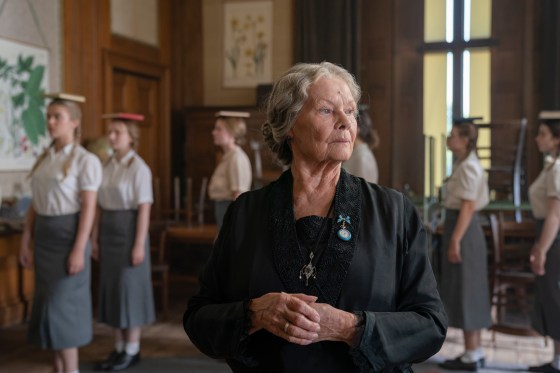New top story from Time: With Six Minutes to Midnight, Eddie Izzard Spins an Unusually Gentle-Spirited Spy Tale
Six Minutes to Midnight, an espionage drama directed by Andy Goddard and starring Eddie Izzard and Judi Dench, has a gentle spirit that you don’t expect from a period spy thriller—but then, there aren’t many spy thrillers with imperiled schoolgirls at their center. It’s August of 1939, and England is on the brink of a war whose scope it can’t yet imagine. Izzard plays a teacher, Thomas Miller, who takes a job at Augusta-Victoria College, a finishing school in the coastal town of Bexhill-on-Sea that’s sort of a cross-cultural experiment between England and Germany. The attendees are all young German women from “good” families, very possibly the daughters, nieces or goddaughters of Nazi officials. But they’re also just girls, teenagers, and the school’s headmistress, Miss Rocholl (Judi Dench), has a great deal invested in giving them a proper English education, as well as simply keeping them safe. Even with her countrymen becoming increasingly suspicious, with good reason, of all things German, Miss Rocholl insists on believing in the basic decency of her young charges.
Yet the school is in turmoil. The school’s former English teacher has mysteriously disappeared; Miller is to be his replacement, and Miss Rocholl puts him through a frosty, unwelcoming interview before hiring him. Miss Rocholl’s right-hand woman, Ilse (Carla Juri), seems friendly enough, but there’s something secretive about her too. And after a mixup on a rainy night, Miller finds himself a murder suspect, on the run from the police, and embroiled in an espionage scheme. Just as the whole nation is on edge, this proper little school has also been rattled to its core.

Six Minutes to Midnight was written by Goddard, Izzard and Celyn Jones, and its subject has special meaning for Izzard: Her family is from Bexhill-on-Sea, and she spent a great deal of time there as a child. (Izzard disclosed in December that she is transgender and uses she/her pronouns.) The Augusta-Victoria College was a real school, in operation from 1932 to 1939; the badges on the girls’ uniforms, reproduced in the movie, featured a lion rampant flanked by both a Union Jack and a swastika. The idea for Six Minutes to Midnight emerged from Izzard’s fascination with the school.
Read more reviews by Stephanie Zacharek
As compelling as the raw idea may be, the plot of Six Minutes to Midnight could have been more finely tuned. In her devotion to her charges, Miss Rocholl is a bit too blind to the dangers they might pose to her own country; while some of the girls seem genuinely innocent and naïve, others have clearly been schooled in Nazi ideals. (A scene in which a character shocks the young women with a chilly lecture about anti-Semitism makes them seem more clueless than some earlier scenes have led us to believe.)
But the movie is still quietly entertaining, and there’s something heartfelt about its approach—it seems guided by a desire to believe that young people’s views can be shaped and redirected for the better by simple kindness. Izzard, so dazzling as a live performer, is always fun to watch onscreen: As Miller, she has a vibrant, inquisitive energy. (In an early scene, Miller wins over his somewhat unwelcoming new students by teaching them a good old English music-hall song, “It’s a Long Way to Tipperary.”) And as shot by Chris Seager, the movie is gorgeous to look at, giving us seascapes and craggy cliffs with a dreamy, misty edge, as if they were somehow aware of our presence, viewing them from our vantage point some 60 years in the future. The sea and its surrounding rocks are features of the natural world that have borne witness to sights we might never have dreamed of, including neat rows of young German girls, in black bathing suits and white caps, heading out into the white-tipped waves for a swim. Six Minutes to Midnight is a tribute to those real-life girls who, as guests from a land that would soon become a vicious enemy, represent a strange little intersection of English and German history—the human element behind symbols clashing on a badge.
Comments
Post a Comment